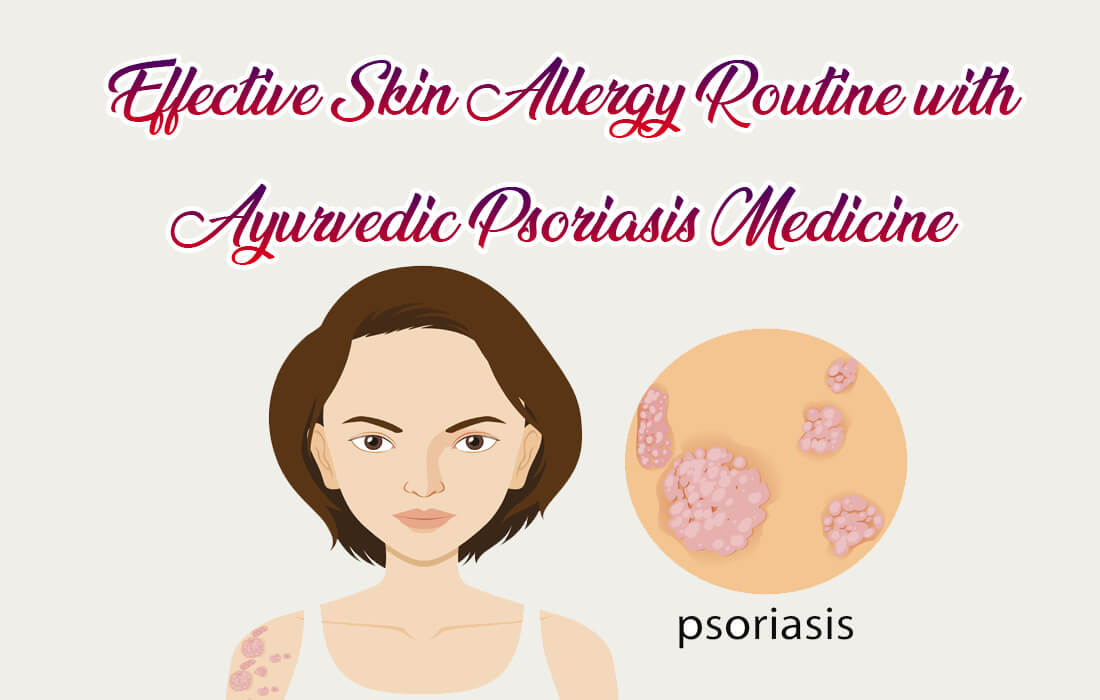Navigating life with psoriasis brings its own set of challenges, especially when dealing with the discomfort of itchy skin allergies. Effectively managing this skin condition requires a comprehensive approach that addresses both visible symptoms and underlying factors. This article focuses on understanding psoriasis allergy and the positive benefits of integrating ayurvedic psoriasis medicine into your everyday skincare routine.
Introduction to Psoriasis Allergy
Psoriasis, characterized by the chronic autoimmune accumulation of skin cells leading to red, scaly patches, presents a formidable challenge. These flare-ups often find exacerbation through various triggers, with allergies standing out as a prevalent factor. Psoriasis allergic reactions add a layer of complexity with both itching and inflammation. Understanding psoriasis allergy is crucial for developing informed strategies to effectively address and manage this intricate skin condition.
Daily Psoriasis Skin Allergy Routine
A daily routine is crucial for handling skin allergies associated with psoriasis. By prioritizing your skincare and psoriasis allergy medicine, you can ease discomfort and enhance the well-being of your skin. Let’s explore the essential steps in your daily routine for managing psoriasis skin allergy.
- Gentle Cleansing: Start your skincare regimen with a mild cleanser formulated with Ayurvedic herbs known for their skin-soothing properties. Neem, turmeric, and aloe vera are renowned for their anti-inflammatory and antimicrobial effects, helping to cleanse and calm irritated skin.
- Nourishing the Skin with Ayurvedic Oils: Ayurvedic oils are crucial in moisturizing and nourishing psoriasis-prone skin. Choose oils like coconut, neem, or sesame, traditionally used in Ayurveda, for their ability to penetrate the skin deeply, relieving dryness and itching.
- Herbal Masks for Psoriasis Relief: Incorporate herbal masks into your weekly routine to promote skin healing. A combination of sandalwood, turmeric, and rose water can create a soothing mask that helps reduce inflammation and redness. These natural ingredients are known for their anti-allergic properties, which relieve itchy skin.
- Healthy Diet: Cooling foods like cucumber, mint, and coriander can help balance the heat associated with psoriasis, reducing inflammation and discomfort.
- Identify and Avoid Allergens: Work with a healthcare professional to identify specific allergens triggering your psoriasis flare-ups. Common allergens may include particular foods, environmental factors, or skincare products. Once you’ve identified them, take proactive measures to avoid these triggers in your daily routine.
- Mind-Body Practices for Stress Reduction: Stress is a known trigger for psoriasis and allergies. Incorporate stress-reducing practices such as yoga and meditation into your daily routine. These activities promote overall well-being and can help alleviate symptoms of itching and inflammation.
Conclusion
Managing psoriasis and its associated allergies requires a holistic approach beyond symptom relief. With an effective daily skincare routine integrating medicine itchy skin allergy is a beneficial strategy that contributes to inflammation reduction and overall skin healing. Additionally, including mind-body practices like yoga and meditation in your daily regimen reduces stress and helps alleviate the itchiness connected to psoriasis allergies. By incorporating these comprehensive methods, individuals can work towards a comfortable and well-balanced life, effectively tackling the challenges posed by psoriasis and experiencing relief from the persistent itch.

